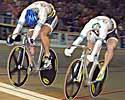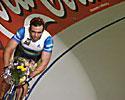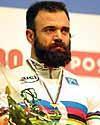
Recently on Cyclingnews.com |
An interview with Sean Eadie, November 19, 2002
2002 Sprint World Champion - the 'Big Man' winds it up
by Lucy Power
Sean Eadie has come a long way. From the kid at age 10 who "couldn't ride out of sight on a dark night" to the 2002 Sprint World champion at age 33. Cyclingnews caught up with the formerly bearded big man at the Munich Six Day to talk about work, play and facial hair.
2002 has seen Eadie grab gold medals at the Commonwealth games, several track world cup competitions, and the greatest prize - Sprint World Champion in Denmark this September. Coming into the World's this year, Eadie's preparation was perfect and his head was in the right place as well.
In the final Eadie faced off against his Australian teammate Jobie Dajka after beating Frenchman Florian Rousseau in the semi-finals. A nailbiting finish to his World's campaign saw Eadie lose the first heat in a photo-finish, decisively win the second, and finish the job in the third to become World Champion.
 |
After Eadie's victory in Copenhagen, the French coach Gerard Quintyn commented on Sean's win, saying he was 'puzzled' by his performance at age 33, at the same time praising his 20-year old teammate Jobie Dajka. The French had just been toppled from their supreme dominance of the Track World's by none other than the Australians.
Sean Eadie commented on Quintyn's remarks, "Good on 'em. They have to worry about their own house, not ours. I had good form all year from the start of January, through the domestic season, through nationals, in the Sydney world cup I beat Arnaud (Tournant) in the sprint and the keirin, second in the grand prix in Paris to (Mickaël) Bourgain and (Laurent) Gané, and won in Hanover. I think once people hear that you're 33, and you haven't already 'been successful', they say, 'Oh, he's not going to make the step', but I've only been racing internationally for 5 or 6 years. In international racing, I'm only a year older than Jobie."
 |
Eadie has been a fixture on the Australian domestic racing scene for a bit longer than six years. He completed his primary teaching qualifications at the Australian Catholic University in 1989/90. By then he had worked out that his preferred profession was cycling, but he "couldn't ride up hills, couldn't time trial on the road, so the option was 'you'd better be able to sprint sunshine, or you're in deep trouble'".
Eadie became a professional track cyclist full-time in 1990, training in Sydney, "doing his own thing". His first selection to an Australian team came at the 1995 Oceania Games, where he won the sprint and came second in the Keirin. After that he continued to develop, as did his results (see sidebar).
 |
1999 saw a spell in the Japanese Keirin world, after being selected as one of the few foreigners to ride the keirin season, a lucrative option for cash-strapped track riders.
Although many Australian track riders do become household names in Australia due to their high-profile Olympic and Commonwealth games results, this status isn't generally reflected in the remuneration offered by the Australian Institute of Sport. Riders at the Institute in Adelaide typically survive on a meagre weekly allowance. Eadie drew attention to this prior to the Commonwealth games in his comments about the English team: "they're overpaid and soft", and the Aussies are the "mongrels".
CN: So it's not the money that keeps you in the sport...
SE: "As you get older, there are more commitments, more
responsibilities, more things eating at your time - but you do it because you
love it. If I wanted to have money I'd go to school and teach."
 |
In 2000 Eadie gave great performances at the Australian titles, but he was unable to translate this into Olympic gold in Sydney, scoring a bronze in the Olympic sprint with teammates Gary Neiwand and Darryn Hill.
At the 2001 World titles in Antwerp Eadie was ousted from the sprint by the eventual silver medallist, Laurent Gané, and partnered with Jobie Dajka and Ryan Bayley to get silver in the Olympic sprint. However, changes were being made in the Australian track cycling coaching arena and a new era was about to begin. At the end of 2001 Quebecois Martin Barras was appointed Australia's senior track coach, and Eadie felt this was his chance to improve further.
 |
CN: Barras has talked in an interview with Cyclingnews
about his programs for centralised sprinters, decentralised endurance track
training. Do you think his programs been personally beneficial for you?
SE: "Absolutely. When Marv (Barras's nickname, Marvelous
Marvin) came across at the end of last year I harassed him pretty intensely
for information on his training structure, on his program, what the components
were, just to get a feel, because he's the third coach we've had in three years
at national level. Gary West, John Beasley, then to Martin - that's three years
of a whole new system to learn and understand."
"Martin was very forthcoming with information and it was very similar to how I used to train independently at home, up to the Sydney Olympics, so it suited me. And also being older, I've already got my strength base, built my muscle mass, so I don't have to spend the time developing strength, which allows us to do more time on the power and speed components of it."
Barras has of course stepped into the shoes of Charlie Walsh, a figure who has had a huge impact on Australian cycling. Has Walsh's departure given Australian coaching staff a new attitude, an interest in trying different approaches?
Sean diplomatically says that Barras and Walsh have different backgrounds and philosophies, so "naturally the approach they're going to have is somewhat different. Charlie's results certainly speak for themselves, as do Marv's, with us and the English team in recent years - guess history will be the judge."
 |
The international elite of the track sprinting world spend a fair bit of time together on the racing circuit as their working year runs from November to October. During that time they train with their own country teams and compete against each other. "When we race, we race really hard, but when we get off we'll chat and have dinner, we're all in the same boat, all away so much, if you can have a chat and a good time with the boys when you're away it just makes the whole trip so much easier to deal with."
CN: But at the World's you're not so chatty?
SE: "It's polite, how you going mate, because that's
exam time."
Eadie is known for enjoying a beer or two, but gave up in May this year, only ending his dry spell after the World's in September. There's not much time in a sprinter's life for R & R, but when they do relax, they seem to party just as hard as they race.
CN: Who are the best drinkers - Aussies, French or Germans?
SE: "Well, historically the Australians go very very
well, in the beer-drinking stakes - in a photo-finish, by about half a length,
Aussies over the Germans, but if we're talking other drinks - there's a notable
French elite rider who's well known for only drinking champagne by the magnum...(at
60 Euro a pop, a bit of an expensive shout)!"
 |
Eadie's attitude to work and play seems to indicate that he's got his head screwed on the right way, with a refreshingly realistic approach to his training and performance goals.
"Ultimately, if I decide to not do as hard a training as I can, or not go to a session, it doesn't affect Marv, it affects me, my performance - you're only doing yourself a disservice," he says.
He's also not worried about his longevity in the sport. "Not at all. I think it's a head game. If the head's fresh you body holds up. You get a few little niggly injuries here and there, you've just got to take a bit more care of yourself. I think invariably it's when the head falls off that the body starts to deteriorate and it's time to get out."
Sean is looking forward to next year, defending his World sprint title, "winning the bloody team sprint" and continuing to hone his form as Athens 2004 gets closer. In Athens, the Australian track team "will be a young group, that'll help, for a large majority it will be their first Olympics, that brings enthusiasm, whereas the Sydney group was a lot older, at the end of a lot of their careers - the highlight and the end. So that brings different emotions and feelings, but the young crew will certainly pick up the banner and drag us old codgers along."
At the end of his track career, which looks like being a few years yet, what
are his options?
"I'd certainly like to explore the coaching option later on, but I'm still
playing the athlete thing at the moment, but from what I've learnt, it would
be nice to try and give something back to the young guys coming through."
But first, "I'd probably go back to teaching, as it would get me back into the routine of a real life, 'cos this is far from that. Get me back on the straight and narrow and then see which direction I want to take."
 |
Finally, no Eadie interview would be complete without mentioning the famous beard. Debate crops up on Cyclingnews letters pages with reasonable frequency about why cyclists shave their legs. Arguments abound, one of them being that it's aerodynamic, but Eadie put paid to that idea with his luxuriant beard, worn from May to the day it was shaved off by Arnaud Tournant after Eadie's victory in Copenhagen.
CN: Isn't it counter-aerodynamic to shave your legs but
not shave your face?
SE: "Won the team sprint and went 10.14 in Manchester,
won the World's - wasn't too counterproductive!"
CN: So why bother shaving your legs then?
SE: " Because it feels great in bed."
There you have it folks!
Read more:
Reports from the World Track Championships - Eadie's
sprint victory.
Cyclingnews interview with Martin
Barras.
Other Talking Cycling Interviews

